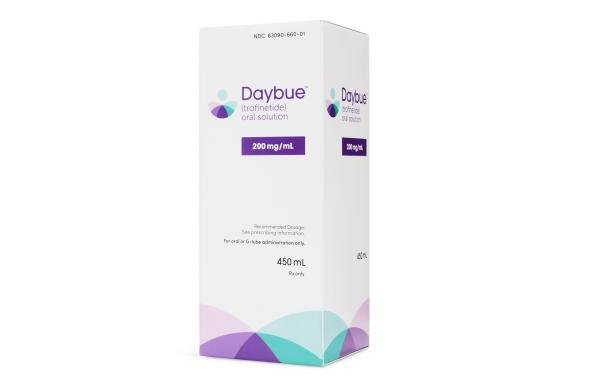Generic Daybue Availability
Last updated on Sep 10, 2025.
Daybue is a brand name of trofinetide, approved by the FDA in the following formulation(s):
DAYBUE (trofinetide - solution;oral)
-
Manufacturer: ACADIA PHARMS INC
Approval date: March 10, 2023
Strength(s): 200MG/ML [RLD]
Is there a generic version of Daybue available?
No. There is currently no therapeutically equivalent version of Daybue available in the United States.
Note: Fraudulent online pharmacies may attempt to sell an illegal generic version of Daybue. These medications may be counterfeit and potentially unsafe. If you purchase medications online, be sure you are buying from a reputable and valid online pharmacy. Ask your health care provider for advice if you are unsure about the online purchase of any medication.
See also: Generic Drug FAQ.
Related patents
Patents are granted by the U.S. Patent and Trademark Office at any time during a drug's development and may include a wide range of claims.
-
Compositions of trofinetide
Patent 11,370,755
Issued: June 28, 2022
Inventor(s): Blower; Clive et al.
Assignee(s): NEUREN PHARMACEUTICALS LIMITED (Auckland, NZ)This disclosure describes compounds of Formula (I), stereoisomers, side compounds thereof, pharmaceutical compositions and methods of manufacturing such compounds, using silylation reagents and producing compositions and products made using such methods. More particularly, this disclosure describes manufacture of trofinetide and side products, compositions and products containing such compounds, for pharmaceutical uses to treat neurodegenerative or neurodevelopmental disorders. ##STR00001##
Patent expiration dates:
- August 3, 2040✓✓
- August 3, 2040
-
Crystalline forms of trofinetide
Patent 11,827,600
Issued: November 28, 2023
Inventor(s): Peterson; Matthew et al.
Assignee(s): Acadia Pharmaceuticals Inc. (San Diego, CA)This disclosure provides crystalline forms of trofinetide and trofinetide hydrate, pharmaceutical compositions comprising crystalline forms of trofinetide and trofinetide hydrate, methods of making crystalline forms of trofinetide or trofinetide hydrate, and methods of treating a disease, condition, or disorder in a subject comprising administering a composition comprising crystalline forms of trofinetide or trofinetide hydrate to the subject.
Patent expiration dates:
- July 12, 2042✓✓✓
- July 12, 2042
-
Treatment of rett syndrome using glycyl-L-2-methylprolyl-L-glutamic acid
Patent 9,212,204
Issued: December 15, 2015
Inventor(s): Glass Lawrence Irwin & Bickerdike Michael John & Snape Michael Frederick
Assignee(s): Neuren Pharmaceuticals LimitedThis invention provides compounds, compositions and methods for treating Autism Spectrum Disorders (ASD) using glycyl-2-methylprolyl-glutamic acid (G-2-MePE) and analogs thereof. Autism Spectrum Disorders include Autism, Autistic Disorder, Asperger Syndrome, Childhood Disintegrative Disorder, Pervasive Developmental Disorder—Not Otherwise Specified (PDD-NOS), Fragile X Syndrome, and Rett Syndrome. Compositions containing compounds include water-soluble formulations, water-in-oil micro-emulsions, water-in-oil coarse emulsions, water-in-oil liquid crystals, nanocapsules, tablets, and orally administered gels. The compounds and compositions of this invention can be administered intravenously, intraventricularly, parenterally, or orally, and can be effective in treating neurodegeneration, promoting neurological function, treating seizure activity and other symptoms of ASD, and can prolong life in animals including human beings having Autism Spectrum Disorders.
Patent expiration dates:
- January 27, 2032✓
- January 27, 2032
Related exclusivities
Exclusivity is exclusive marketing rights granted by the FDA upon approval of a drug and can run concurrently with a patent or not. Exclusivity is a statutory provision and is granted to an NDA applicant if statutory requirements are met.
Exclusivity expiration dates:
- March 10, 2028 - NEW CHEMICAL ENTITY
- March 10, 2030 - TREATMENT OF RETT SYNDROME IN ADULTS AND PEDIATRIC PATIENTS 2 YEARS OF AGE AND OLDER
More about Daybue (trofinetide)
- Check interactions
- Compare alternatives
- Pricing & coupons
- Drug images
- Side effects
- Dosage information
- During pregnancy
- FDA approval history
- Drug class: miscellaneous central nervous system agents
- Breastfeeding
- En español
Patient resources
Professional resources
Related treatment guides
Related/similar drugs
Glossary
| Term | Definition |
|---|---|
| Drug Patent | A drug patent is assigned by the U.S. Patent and Trademark Office and assigns exclusive legal right to the patent holder to protect the proprietary chemical formulation. The patent assigns exclusive legal right to the inventor or patent holder, and may include entities such as the drug brand name, trademark, product dosage form, ingredient formulation, or manufacturing process A patent usually expires 20 years from the date of filing, but can be variable based on many factors, including development of new formulations of the original chemical, and patent infringement litigation. |
| Drug Exclusivity | Exclusivity is the sole marketing rights granted by the FDA to a manufacturer upon the approval of a drug and may run simultaneously with a patent. Exclusivity periods can run from 180 days to seven years depending upon the circumstance of the exclusivity grant. |
| RLD | A Reference Listed Drug (RLD) is an approved drug product to which new generic versions are compared to show that they are bioequivalent. A drug company seeking approval to market a generic equivalent must refer to the Reference Listed Drug in its Abbreviated New Drug Application (ANDA). By designating a single reference listed drug as the standard to which all generic versions must be shown to be bioequivalent, FDA hopes to avoid possible significant variations among generic drugs and their brand name counterpart. |
Further information
Always consult your healthcare provider to ensure the information displayed on this page applies to your personal circumstances.

